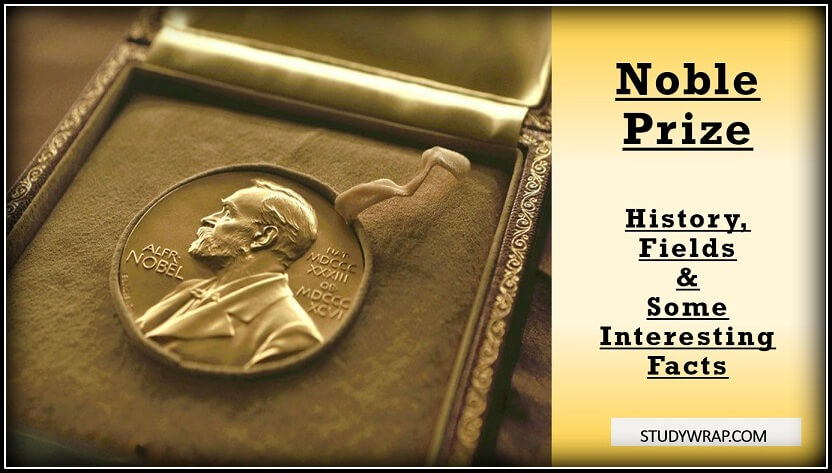General Knowledge
Noble Prize – History, Fields & Some Interesting Facts
Noble Prize – History, Fields & Some Interesting Facts
Table of Contents
What is Noble Prize?
- The will of the Swedish inventor Alfred Nobel established the prizes in 1895.
- Noble Prize an international award which is given each year to “those who, during the preceding year, have conferred the greatest benefit to humankind.”
- Alfred Nobel was a Swedish chemist, engineer, and industrialist most famously known for the invention of dynamite. He died in 1896. In his will, he bequeathed all of his “remaining realisable assets” to be used to establish five prizes which became known as “Nobel Prizes.” Nobel Prizes were first awarded in 1901.
- First Indian Nobel Prize winner is Rabindhranath Tagore. He got this award in 1930.
Fields of Noble Prizes
- The Prizes in Chemistry, Literature, Peace, Physics and Physiology or Medicine were first awarded in 1901.
- The set of communities associated with the awards presentation are-
- Nobel Assembly at the Karolinska Institute (Physiology or Medicine)
- Norwegian Nobel Committee (Peace)
- Royal Swedish Academy of Sciences (Chemistry, Economic Sciences, Physics)
- Swedish Academy (Literature)
- The Sverige Riksbank Prize in Economics Science in Memory of Alfred Nobel was establish in 1986 by Bank of Sweden.
Noble Prize
- Each recipient receives a gold medal, a diploma and a sum of money that has been decided by the Nobel foundation.
- Inscription on the Medals –
- The inscription on all medals (except Peace prize medal): “Inventas Vitam Juvat Excoluisse Per Artes” which loosely means “and they who bettered life on earth by new found mastery“. Verbatim translation is “Inventions enhance life which is beautified through art“.
- Inscription on the Peace prize medal: “Pro Pace et Fraternitate Gentium“, which means “For the Peace and Brotherhood of Men“.
- A prize may not be shared among more than three individuals, although the Nobel Peace Prize can be awarded to organizations of more than three people.
- Once awarded, a Nobel Prize cannot be revoked and no appeal is allowed against the decision of a prize awarding body.
- All Nobel Prizes are given in Stockholm, Sweden except for the Peace Prize. The Nobel Peace Prize is given in Oslo, Norway on 10th December, in presence of the King of Norway, on the death anniversary of Alfred Nobel.
Interesting Facts about Noble Prize
- The First Person to get the award in –
-
- Physics – WILHELM RONTGEN (in 1901 for discovering X-Rays)
- Chemistry – JACOBUS HENRICUS van‘t HOFF (in 1901)
- Literature – SULLY PRUDHOMME (in 1901)
- Peace – JEAN HENRY DUNANT (founder of International Red Cross) jointly with FREDERIC PASSY (President of First French Peace Society) in 1901
- Medicine – EMIL ADOLF von BEHRING (in 1901)
- Economics – RAGNAR FRISCH and JAN TINBERGEN (in 1969)
-
- Linus Pauling is the only person to have been awarded two unshared Nobel Prizes – the 1954 Nobel Prize in Chemistry and the 1962 Nobel Peace Prize.
- Switzerland-based International Committee of the Red Cross is the only 3-time recipient of the Nobel Prize, being conferred with Peace Prize in 1917, 1944, and 1963.
- US leads the pack with 388 Nobel Prize laureates, followed by UK with 133.
- Malala Yousafzai, aged 17, (DOB – 12 July 1997) at the time of receiving the Nobel Peace prize 2014, is the youngest to receive it.
- John B. Goodenough is the oldest recipient of Noble Prize in 2019. He received it at the age of 97 (DOB – 25 July 1922) for work in the field of Chemistry.
- United Nations (UN) Secretary Generals who won the prize – Dag Hammarskjoid (posthumously – for Peace 1961) and Kofi Annan (Peace 2001)
- US Presidents who won the prize – Theodore Roosevelt, Woodrow Wilson, Jimmy Carter (was not president when he was awarded), and Barack Obama. They all won Noble Prize for Peace.
- Marie Curie is the only woman who won the Noble Prize twice. She won the Nobel Prize in Physics 1903 and Nobel Prize in Chemistry in 1911.
- She was the first woman to win a Nobel Prize.
- Marie Curie was the first person to win two Nobel Prizes.
- She is the only person to have won two Nobel Prizes in two different scientific fields.
- The Curie family has won four Nobel Prizes: Marie Curie (2), Pierre Curie (1) and their daughter Irène Joliot-Curie (1).
- Dag Hammarskjöld (Nobel Peace Prize 1961), the second Secretary-General of the United Nations, and Erik Axel Karlfeldt (Nobel Prize in Literature 1931) are the only two people who have been given Nobel Prize posthumously.
- Jean-Paul Sartre and Le Duc Tho are the only two people to have declined the Noble Prize.
- So far, six married couples have won the Nobel Prizes –
-
- Marie Curie and Pierre Curie (in Physics, 1903)
- Irène Joliot-Curie and Frédéric Joliot (in Chemistry, 1935)
- Gerty Cori and Carl Cori (in Medicine, 1947)
- May-Britt Moser and Edvard I. Moser (in Medicine, 2014)
- Alva Myrdal (in Peace, 1982) and Gunnar Myrdal (in Economics, 1974)
- Esther Duflo and Abhijit Banerjee (in Economics, 2019)
-
- International organizations ICRC and UNHCR have won three and two Nobel Peace Prizes respectively.
So, this was all about the important Noble Prize – History, Fields & Some Interesting Facts. In the Next Post (Click Here), we will learn about the First Nobel Prize Winners of different Countries.
If you Like this Post than please share it with your friends and family and like our Facebook Page to get regular updates. Sharing is Caring J.

